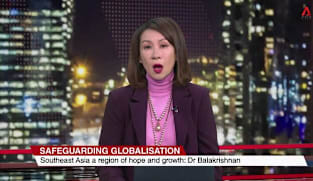Pritam Singh on Workplace Fairness Bill
The Workplace Fairness Bill marks a "major philosophical shift" in the PAP Government’s thinking on workplace discrimination, said Leader of the Opposition Pritam Singh. He pointed out that this has taken too long but late though it is, "the change is for the better". Speaking in Parliament on Tuesday (Jan 7), Mr Singh said the Bill sends a fundamental and powerful message and speaks of how the state deals with where Singaporeans stand at the workplaces in their own country. Mr Singh, who told the House that the Workers’ Party supports the Bill, said it is also significant in how it seeks to achieve certain important goals and to balance the relationship between workers and employers. It covers discrimination not just with respect to hiring decisions, but to employment decisions such as performance, appraisals, promotions, opportunities and dismissals, he added. Mr Singh noted that the Bill does not cover indirect discrimination, as the Tripartite Committee opined that it would impose very wide legal obligations on employers, resulting in uncertainty for employers and employees. There was also concern about an overly legalistic relationship between employer and employee. Mr Singh noted that while this perspective is not completely without merit, it must be remembered there could be some cases of employment decisions that arise out of norms, culture or processes that are nonetheless discriminatory. “This would be one area to monitor closely, going forward, to better support workers who are commonly in a more inferior bargaining position compared to their bosses and employers who exert significant control over them,” he said. To complement the Bill, it would be critical for the Tripartite Alliance for Fair and Progressive Employment Practices to list examples of such indirect discrimination and profile publicly, he added. Mr Singh said the Bill is “not just a piece of manpower legislation” but also a social legislation. He stressed the need to promote greater professionalism and mutual respect at the workplace through open conversations.
The Workplace Fairness Bill marks a "major philosophical shift" in the PAP Government’s thinking on workplace discrimination, said Leader of the Opposition Pritam Singh. He pointed out that this has taken too long but late though it is, "the change is for the better". Speaking in Parliament on Tuesday (Jan 7), Mr Singh said the Bill sends a fundamental and powerful message and speaks of how the state deals with where Singaporeans stand at the workplaces in their own country. Mr Singh, who told the House that the Workers’ Party supports the Bill, said it is also significant in how it seeks to achieve certain important goals and to balance the relationship between workers and employers. It covers discrimination not just with respect to hiring decisions, but to employment decisions such as performance, appraisals, promotions, opportunities and dismissals, he added. Mr Singh noted that the Bill does not cover indirect discrimination, as the Tripartite Committee opined that it would impose very wide legal obligations on employers, resulting in uncertainty for employers and employees. There was also concern about an overly legalistic relationship between employer and employee. Mr Singh noted that while this perspective is not completely without merit, it must be remembered there could be some cases of employment decisions that arise out of norms, culture or processes that are nonetheless discriminatory. “This would be one area to monitor closely, going forward, to better support workers who are commonly in a more inferior bargaining position compared to their bosses and employers who exert significant control over them,” he said. To complement the Bill, it would be critical for the Tripartite Alliance for Fair and Progressive Employment Practices to list examples of such indirect discrimination and profile publicly, he added. Mr Singh said the Bill is “not just a piece of manpower legislation” but also a social legislation. He stressed the need to promote greater professionalism and mutual respect at the workplace through open conversations.



















